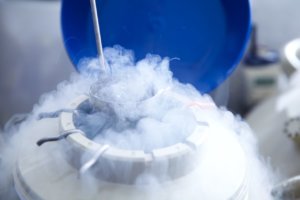A New York City fertility doctor says his office has been flooded with requests from women who want their eggs quickly harvested and frozen amidst coronavirus fears — and that he’s been called upon as a one-man information outlet, despite having no government guidance to draw upon regarding COVID-19 and fertility.

“The number one thing people are asking us for is guidance on what to do,” Brian Levine, MD, director of CCRM Fertility NY tells Yahoo Lifestyle. “And that, unfortunately, is the one thing we cannot offer them, as neither the Centers for Disease Control and Prevention (CDC) or the American College of Obstetrics and Gynecologists (ACOG) has come out with a position statement” on fertility and the coronavirus.
“So, we are right now in a very bizarre time, where the only thing that we know what to say or do is ‘avoid the virus as much as possible,’” says Levine, who told the New York Post earlier this week he’s seen “at least a 25 percent increase in volume” of patients. Since that story broke on Thursday, he tells Yahoo Lifestyle, “we’ve seen even more patients and had more calling for feedback.”
The calls are coming with a sense of urgency, Levine explains, with many calling “and saying, ‘I want to be treated tomorrow, I want to freeze eggs or embryos as soon as possible.’ I’m happy to do phone consults, but what I’m finding I have to do is help educate people about the process: It takes two weeks to go through ovarian stimulation to the point of retrieving eggs. You can’t just walk in and get them aspirated or sucked out. It takes time to do a proper workup.”
But in their minds, he says, “they think they are getting coronavirus tomorrow, and want to get treated today.”
A small study conducted by the World Health Organization, published Friday, found that pregnant women are no more likely than others to have severe symptoms with coronavirus, although consequences to babies born to these moms are not yet known.
And while the CDC does not, in fact, offer specific guidance on COVID-19 and fertility, regarding pregnancy, it says, “We do not have information from published scientific reports about [the] susceptibility of pregnant women to COVID-19.” Also, it notes, “We do not have information on adverse pregnancy outcomes in pregnant women with COVID-19. Pregnancy loss, including miscarriage and stillbirth, has been observed in cases of infection with other related coronaviruses [SARS-CoV and MERS-CoV] during pregnancy. High fevers during the first trimester of pregnancy can increase the risk of certain birth defects.”
Further, the CDC website says, “Whether a pregnant woman with COVID-19 can transmit the virus that causes COVID-19 to her fetus or neonate by other routes of vertical transmission (before, during, or after delivery) is still unknown.” ACOG, meanwhile, refers to the CDC guidelines and also offers some guidance on infection prevention and control in obstetric care settings.
Along with potential new patients who have been calling Levine in a deluge, he says, have been established patients who have had a workup and “are calling with increased frequency, saying they were going to transfer embryo in April or May but want to do it earlier. I did not predict that one.” But in that case, Levine notes, “we’re happy to proceed. But the worst thing we can do is rush to treatment without knowing who the patient is or what they need.”
Not rushing in is a smart idea, says Suzanne Willard, clinical professor and associate dean for global health at the School of Nursing, Rutgers Global Health Institute. “Really? A run on fertility clinics? We really need to work with facts and check our emotions,” she tells Yahoo Lifestyle in an email regarding the increase in business at CCRM. “Emotions are driving much of this response, instead of listening to science. The scientists are working hard to understand this, and it is still a new phenomenon, and we don’t know everything now.”



